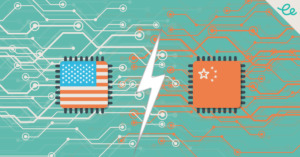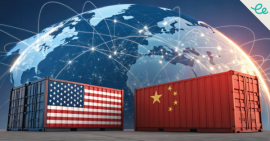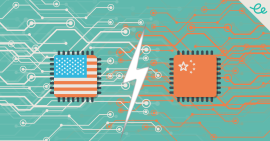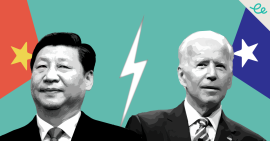All the mixed signals were on display this month of the troubled, complex and still wide-ranging relationship between the world’s two largest economies. President Trump cancelled talks but top trade officials managed to speak even as both sides swapped barbs and sanctions. This article is a summary of important news affecting China US relations in August 2020.
“I had a great relationship with President Xi. I like him, but I don’t feel the same way now,” after the pandemic, said Trump, admitting they haven’t spoken “in a long time”. Later he added that he had cancelled talks with China. “I don’t want to talk to China right now.”
Top US and Chinese trade officials did hold their first formal dialogue since early May (by phone), reaffirming commitment to the Phase 1 deal. Beijing is set to buy a record amount of American soybeans this year, possibly enough to salvage the deal even if not reaching the promised total.
Military tensions persisted as the PLA launched four anti-ship ballistic missiles into the South China Sea on Wednesday, the same day that Washington blacklisted 24 Chinese companies and targeted individuals over construction and military actions in the busy and contested waterway. China said it warned off a US guided-missile destroyer deployed after the launch.
Beijing has been conducting military drills almost simultaneously in four sea regions, a rare move likely signalling its readiness to handle a confrontation with the US and Taiwan. “Those who play with fire will get burned,” warned Beijing after US health secretary Alex Azar became the highest-ranking US official to visit in decades. “It is increasingly plain from the impatience in Xi’s language that he wishes to see Taiwan return to Chinese sovereignty within his own political term,” warned Kevin Rudd.
Chinese Foreign Minister Wang Yi said Beijing rejected any attempt to create a new Cold War or revive McCarthyism. China has no intention of unseating the United States as a superpower, he said. Beijing imposed sanctions on 11 US citizens, in response to Washington’s sanctions on officials accused of curtailing political freedoms in Hong Kong.
Citing national security concerns, President Trump ordered a sweeping but unspecified ban on dealings with the Chinese owners of WeChat and TikTok. The two executive orders, taking effect in 45 days, represent a sharp escalation of the administration’s confrontation with China, and likely to provoke retaliation. Trump accused the pair of providing a channel for the Communist Party to obtain Americans’ proprietary information, keep tabs on Chinese citizens abroad and carry out disinformation campaigns to benefit China’s interest.
The spike in tensions has stoked fears in China of a financial iron curtain, shutting it out of the global dollar system, and reviving calls to bolster the yuan’s global clout and bypass dollar settlement with a digital version. Like a celebrity couple splitting on account of irreconcilable differences, China and the US may leave a huge mess, and tech firms may have to pick sides, said the Wall Street Journal. Although more flights are resuming, thousands of China-based US business executives may never return, reducing a traditional buffer in conflict.









Comments are closed.